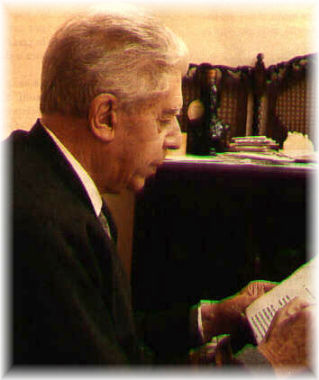| Eugenio
Montale was born in Genoa in 1896; he was the last of six children in a
family of merchants and chimical product importers. He was registered at
the Father Barnabiti schools but, for health reasons, he stopped
studying at the technical third class; but later on, in 1913, he
succeeded, as a self taught-men, in taking a diploma of accountant. In
1917 he was called to arms and as an official cadet he went to the war
zone and fought as a volontary in Trentino. During the official cadet
course, he made friends with Sergio Solmi who was a university student
at that time. In 1920 when he returned to Genoa he continued living the
usual way: no regular jobs, summer vacation in Monterosso, Cinque Terre,
the frequency of literary milieus. In 1922 he made his debut on the
Torinese magazine “Primo Tempo” directed by Solmi and G. Debenedetti
with the seven essays of Accordi and the poetry Riviere, all works
written between 1919 and 1921. He became famous by the collection
“Ossi di Seppia”, printed in Turin by Gobetti editions and by Solmi
( the oldest poetry of this collection was written in 1916: Meriggiare
pallido e assorto). In the same year Montale’s political-literary
aspect was defined through public interventions like subscribing the
antifascist intellectuals’ Croce manifest or publishing, on the
Milanese magazine “L’Esame”, the omaggio at Italo Svevo. Leaving
Genoa in 1927, he went to Florence with Bemporard publisher and then
from 1929 as a director of the scientific-literary study Vieusseux from
where he was removed in 1938 because he didn’t join the fascist party.
The years he spent in Florence were very busy; he surpassed his poetic
universe and produced “Le Occasioni”, a collection in 1939 and other
lyric poetries. Later on he bound himself to the antifascist writers
round the magazine “Solaria”. In 1927 in Florence he met Drusilla
Tanzi who became his wife. At the end of the war he joined for a short
period the action party and he carried on the activity of journalist for
“La Nazione del popolo” and was also a co-director, with Bonsanti
and Loria, of the fortnightly magazine “Il Mondo”. Milan was the
third city where he lived. He moved there in 1948 because he was a
member of the editorial staff of the “Corriere della sera” where he
remained up to 1973. In 1956 he published the collection of memories and
confessions ”La Farfalla di Dinard”; it was evident the organic
connection between prose and poetry. The collection Satura (1971)
including the Xenia published in 1966 was dedicated to his wife who died
in 1963; this collection produced a cycle of a big poetic productiveness,
a fourth season for Montale. In a few years, after Satura, he produced
two more collections “Diario” (1971 and 1972) and “Quaderno di
quattro anni” (1977). He spent the last years of his life, in Milan,
looked after by his housekeeper Gina Tiossi. In 1967 he was appointed
senator for life (he joined the liberal party). In 1975 he received the
Nobel Prize. He died in 1981.
|
